Contents
- Introduction
- Preface
- Overview
- Relief Valve
- LECTURE 1: Why We Are In The Dark About Money
- LECTURE 2: The Con
- LECTURE 3: The Vatican-Central to the Origins of Money & Power
- LECTURE 4: London The Corporation Origins of Opium Drug Smuggling
-
LECTURE 5: U.S. Pirates, Boston Brahmins Opium Drug Smugglers
-
THE BOSTON BRAHMINS
- Clipper Ships
- The Boston Money Tree
- John Perkins Cushing
- Abiel Abbott Low
- William H. Russell and Samuel Russell
- The Combination Russell, Jardine, and Matheson
- Russell Sturgis
- Colonel Thomas Handasyd Perkins
- The Perkins Family
- Frances Perkins--The Only Good Brahmin
- American House of Russell and Co.
- Harvard Corporation
- Opium to Brahmins to Yale to CIA
- Forbes Family I
- Warren Delano
- Hope & Co. - Baring Brothers Bank
- John Jacob Astor
- Taft Family
- 1924 America's 1% Exposed
- Proof FDR Knew About his Grandfather's connection with Opium China Trade
- Forbes - John Kerry Family II
- George Bush Family Origins in Opium Drug Smuggling
- Black Market Bones
- Thuggee Barbara Bush Family
- Thuggee Bush Family and the CIA
- John Quincy Adams and the Chinese Opium Trade
- The Ammidons
- Augustine Heard
- Joseph Coolidge IV
- Lowell Family
- Pirates Profiteers Banksters Traders Transfers
- Pirates
- White Slavers, Cargo, Property, Auctions, Amazing Grace
- $ Colonial Labor: Indentured Servants
- England to Philadelphia Slave Trade and Opium
- Extract from Charter of Freedoms and Exemptions to Patroons 1629
- The Definitive Treaty of Peace
- Pennsylvania Charter of Privileges 28 October 1701
- Opium Trade -- American Drug Smuggling Pirates
- Opium In America
- 1% Power Elite Networks
- 1% Elite Networks Bush & The CIA
- BEFORE Skull & Bones
- SKULL AND BONES
- Caribbean Pirates in the American South
- Who Were the Tories
- The Golden Age of Imperialism Opium Act 1908
- Global Dominance Groups
- The New World Order
- Characteristics of Fascism
- War on drugs
- Lecture 5 Objectives and Discussion Questions
-
THE BOSTON BRAHMINS
- LECTURE 6: The Shady Origins Of The Federal Reserve
- LECTURE 7: How The Rich Protect Their Money
- LECTURE 8: How To Protect Your Money From The 1% Predators
- LECTURE 9: Final Thoughts
Money trail from drugs to Presidential Nomination
Following the Forbes Money Trail
JOHN KERRY
JOHN FORBES KERRY: DRUG ROYALTY
John Forbes Kerry,
the current United States Secretary of State, is a blue-blooded patrician oligarch and member of the infamous Yale Skull and Bones secret society.
Kerry is a member from 1965
Student Tasered for asking!
Forbes family
The Forbes family descends from the Scottish Clan Forbes which was seated in Aberdeenshire, Scotland.
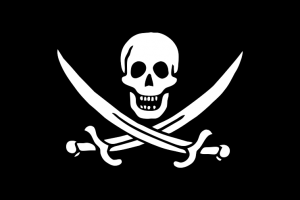 Captain Robert Bennet Forbes (1804–1889), was a sea captain, China merchant, ship owner. Son of Ralph Bennet Forbes and wife Margaret Perkins, of the Perkins family, and brother of John Murray Forbes. "As a member of the Forbes family of Boston, much of his wealth was derived from the opium and China Trade and he played a prominent role in the outbreak of the Opium War.
Captain Robert Bennet Forbes (1804–1889), was a sea captain, China merchant, ship owner. Son of Ralph Bennet Forbes and wife Margaret Perkins, of the Perkins family, and brother of John Murray Forbes. "As a member of the Forbes family of Boston, much of his wealth was derived from the opium and China Trade and he played a prominent role in the outbreak of the Opium War.
Treasures of the Forbes Opium Smuggling Family who own Naushon Island just off of Cape Cod, Mass. "The Forbes of Naushon made their fortune in transoceanic trade in the 19th-century, including exchanging smuggling opium from Turkey for Chinese tea and silk."
John Kerry's Private Island and Family History.
Naushon Island Naushon Island has been a Forbes family retreat for some time, where the opium trader John Murray Forbes and his family summered for more than a century. Sen. John Forbes Kerry and his first cousin Brice Lalonde summered there, and at another Forbes family estate in France, at Saint-Brieuc when he was growing up. The family owns the island through the J.M. Forbes Naushon Island Trust. Naushon island is several miles long, just off (SW of) Cape Cod in the Elizabeth Islands, and NW of Martha's Vineyard. The island is owned by the family and they pay little or no property taxes as the use of the island is deemed agricultural by the local authorities. Nashawena island may also be controlled by the family trust. All of the Elizabeth Islands except Cuttyhunk are privately owned by the Forbes family.
In 1834 Captain Forbes married Rose Greene Smith. She died September 18, 1885, having borne her husband three children: Robert Bennet Forbes, born 1837, died June 30, 1891; Edith Forbes, married Charles Eliot Perkins; James Murray Forbes, born July 17, 1845.
- Forbes, Robert Bennet (1844). Remarks on China and the China Trade. Boston: Samuel N. Dickinson, printer.
- Forbes, Robert Bennet (1847). The Voyage of the Jamestown on Her Errand of Mercy. Boston: Eastburn Press.
The first member of the Forbes family to live in the United States was John Forbes (1740–1783), a clergyman, who was married to Dorothy Murray on February 2, 1769 in Milton, Massachusetts, where one of his three sons were born. The family is considered part of the Boston Brahmin although Rev. John Forbes's first post on the North American continent was in British East Florida, where he was the first Anglican clergyman licensed to officiate. There is also a link to the Dudley-Winthrop family directly from Thomas Dudley, father of Anne Bradstreet, the first female poet from America.
Edward Waldo Forbes was born on July 16, 1873 on Naushon Island off Cape Cod in Massachusetts. His father, William Hathaway Forbes, was a co-founder of the Bell Telephone Company with Alexander Graham Bell. His mother, Edith Emerson Forbes, was the daughter of poet Ralph Waldo Emerson. His paternal grandfather, John Murray Forbes, was a French-born railroad magnate, merchant, and abolitionist. His brother, William Cameron Forbes, went on to serve as the United States Ambassador to Japan from 1930 to 1932. Forbes was educated at the Milton Academy, a boarding school in Milton, Massachusetts. He graduated from Harvard University in 1895. Edward Forbes, a historian and director of the Fogg Art Museum at Harvard University from 1909 to 1944. Edward Forbes, a historian and director of the Fogg Art Museum at Harvard University from 1909 to 1944. The pigments in the Forbes collection come from all over the world, and some are stored in their original delicate glass containers.
2015 Of all the palatial London mansions of the British aristocracy obliterated, carved up, or converted over the decades—only one, Dudley House, is now a private home.
The New York Branch
The eldest of the brothers, James Grant Forbes (born 1769), became the progenitor of the New York branch of the Forbes family—the branch from which John Kerry stems.
Having three sons seems to have become a family tradition. One of the sons born to Rev. Forbes was Francis Blackwell Forbes, who, through contacts with the Boston branch of the family, moved to Shanghai and became a merchant in the “China trade,” as well as an avid student of the uses of the Chinese opium poppy. The youngest of Francis Forbes' three sons (born in Shanghai, China in 1879) was named for his grandfather—James Grant Forbes—and would become the grandfather of Presidential candidate John Kerry.
The Forbes family related to US Senator John Kerry.
Monnet's work for Blair and Co. also brought him into the law offices of Blair's attorney, John J. McCloy at Cravath, Swaine & Moore. McCloy represented Chase Manhattan Bank and the seven sisters oil companies, all of which employed the investment banking services of Lazard Freres. Dulles and Lord Brand also arranged for him to assist Chinese loan advisor, T.V. Soong, in 1934 with foreign investment in China. Our path to France thus intersects with another trail within the maze—China.
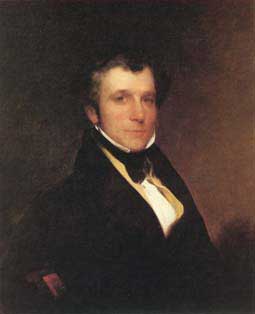
Robert Bennet Forbes (1804-1889) c. 1846
In Robert B. Forbes's autobiography Personal Reminiscences (1882), he talks about talking a trip to visit "constituents" in Europe, in 1841. His uncle, merchant T.H. Perkins went with him. In London they met with Forbes, Forbes and Co, Barings and the Rothschilds, "who were valuable constituents of Russell & Co."
That RB Forbes was obliged to go back to China to make another "opium" fortune—having lost his last because of financial problems brought about by the panic—is to say the least— ironic.
The "Combination", Russell & Company and the Scotch firm Jardine-Matheson, the largest opium trader, together developed a new trade up and down the China coast—the romantic opium clipper—and helped to spread the use of the opium further in China. After the first "Opium War" Russell & Co. became the third largest dealer in opium in the world.
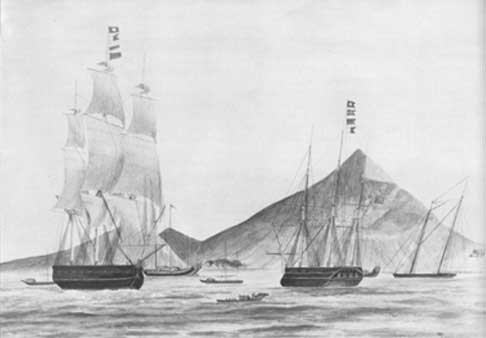
RB Forbes spent many years at the opium smuggling station off Lintin Island c. 1830s Anon.
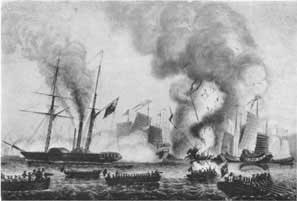 Lure of Lucre – Markets in the Far East
Lure of Lucre – Markets in the Far East
The letter mentioned earlier in the Boston Globe excerpt was written from Shanghai by Kerry's grandfather, James Grant Forbes on April 22, 1938 and addressed to his cousin, William Cameron Forbes.
From this letter we can say with certainty that James Grant Forbes, was not only working with Monnet in Shanghai, China, but that he also maintained a close relationship with his somewhat removed cousin, William Cameron Forbes, who had lived in the Philippines since 1904 as Governor General from 1909 to 1913.
Cameron Forbes returned to Massachusetts at that time, where he served as a Harvard Corporation overseer from 1914 to 1920 before being appointed by President Harding along with Leonard Wood to the Wood-Forbes Commission in 1921, dispatched to the Philippines for investigative purposes. He also is credited with being a member of Massachusetts Institute of Technology Corporation and trustee of the Carnegie Institution for International Peace. He returned to the Far East as ambassador to Japan at the time of the Manchurian crisis in the early 1930's. In 1935 he led an economic mission to East Asia.
john kerry grandfather's espionage
Working Under Cover to Reconstruct China
Because of this mystery, the connection between the two cousins becomes quite intriguing, particularly given the circumstances that occurred in the Philippines during the Japanese occupation there and the disclosures that have been made since about gold buried on those islands. The closeness between James Grant Forbes and Monnet, particularly in China, also raises many questions because of the fact that Monnet's work fell under the auspices of the League of Nations, a group that the U.S. never joined.
Thus it seems likely that any intelligence work conducted by Forbes would not necessarily have been solely on behalf of the United States but rather, perhaps, of another country or group. Monnet first arrived in China in 1935, taking as his assistant Lord Perth, the son of the man who had been the first secretary general of the League of Nations. They hired another Frenchman named Henri Mazot as an agent to set up an office for their Dulles-sponsored investment company, Monnet, Murnane & Co., within the French concession in Shanghai, an office in which Forbes was active as well.
Forbes' and Monnet's business in the French concession of Shanghai can be conjectured with some certainty to have brought them into close contact with the legendary T.V. Soong, whose own business in China was intimately connected with the Green Gang Triad that operated out of the French Concession and which was responsible for the rise of Chiang Kai-shek. This gives us great insight into the intelligence circles in which their network was operating.
The story of the Soong family goes back to their father's education in a small Methodist college in America in the 1880's, the influence he wielded as a Christian missionary to his own people, and to the subsequent education of each of his children in similar American Protestant colleges. It is a tale that reeks of long-term planning on the part of businessmen who desired peaceful, even covert, access into the trading centers of the Orient, which they saw as a huge market opportunity.
Their influence with the Soongs gave them a secret advantage in China during the regimes of Sun Yat-Sen and his successor Chiang Kai-shek through the Soong women that Sun and Chiang married. Control of the Harvard-educated T.V. Soong not only allowed these businessmen to reap huge fees for loans to China, but it gave them a base from which to oppose any attempt by the Chinese government to expropriate private commercial assets.
The peaceful, albeit covert, attempt by Western business to worm its way into Chinese commerce represented a departure from methods used in the 19th century when wars were fought for the sole purpose of forcing China and Japan to trade with Western merchants. Notably, following the First Opium War waged by the British government against China to open the Chinese markets to opium, the Treaty of Nanking in 1843 opened the ports of Canton, Shanghai and three other ports to the opium trade. In retribution, the emperor was required to pay $6 million to compensate for the opium losses to British traders and other acts committed in defense of Chinese laws, as part of a total $21 million in reparations. Britain, the United States, and France were allowed to conduct business as if the city were their own; each colonial group (comprised of the families and their employees we have discussed previously) living in its own “concession” with its own customs and social hierarchies.
THE FORBES AND THE CHINA DRUG TRADE
Americans Enter the Opium Trade Paving the Way for the Forbes Dynasty
"If the trade is ever legalized, it will cease to be profitable from that time. The more difficulties that attend it, the better for you and us." -- Directors of Jardine-Matheson
The Portuguese arrived in China in the early 1500s and after an abortive attempt to settle near latter-day Hong Kong they were permitted to establish a trading base at Macao in 1557. They brought the first European traded opium to China from their colony of Goa. Arab traders had been bringing in opium ever since around 400 A. D. There was already some domestic production for medicinal uses, opium poppies having reached China some 300 years earlier. The trade had become steady—mainly medicinal—about 200 chests a year until the advent of the Europeans. The era of royal-chartered mercantilist enterprises was afloat and as the Portuguese influence in the East began to wane—there was a rush to fill the void. The Dutch, English and French each began large "corporate" ventures into the "spice" trade. There was also trade interests by other European nations plus Russian, Armenian, Jewish, Parsee and American merchants.
The opium trade sparked when the smoking of opium was "introduced." Sailors in the tropics—some for a medicinal benefit against tropical maladies—began to mix opium with their tobacco in their pipes in the late 1500s. This was picked up by various populations and developed into its own subculture. Soon there was the dropping of the mixing with tobacco to a prepared opium smoke (chandu). And special pipes—very similar to ones used on Crete several thousand of years earlier.
The Dutch began trading opium in the 1610s, and not just as a profitable trade item. They used opium "as a useful means for breaking the moral resistance of Indonesians who opposed the introduction of their [Dutch] semi-servile but immensely profitable plantation system."
In 1689, the English began trading at Canton and by the early 1770's they surpassed the Portuguese, Dutch and French to "became the leading supplier" to China.
Because the Spaniards were allies of the America during the US War of Independence and thus no Spanish silver was available to pay for Chinese tea, the British monopolized the source of opium (India) and became the major trafficker. Later, increased competition and the hard facts that a tenth of the British tax base came from tea—and the tea came from China—gave an impetus for an increase in production and reduction in price of opium in the 1820s. "In other words; so that the British public could go on drinking their millions of gallons of tea each year, twice as many Chinese opium addicts (and for that matter, British opium addicts) had to be created." At first, it was thought in China that the English were buying the tea and rhubarb in such large quantities because the Chinese believed the British to be a constipated race because of their dietary inclusion of milk products.
Many historians discount the American activity in the opium trade, generally concentrating on the British and their mercantilist trading syndicate, the British East India Company.
!!! Because of the Navigation Act of 1651, Americans "were not permitted to sail their own ships to the Orient," they were required as colonists and subjects to buy all their Chinese goods in London from the East India Company.
The East India Company's monopoly on the tea trade was more of a reason for the American Revolution than the cost of the tax.
Through a political arrangement the tea was actually coming in for less than it could be bought in England. But the agitation of Samuel Adams, Ben Franklin and others had led to situation where ships were sent back to England unloaded, some cargoes rotted other shipments were destroyed—aka, the Boston Tea Party.
American smugglers, many of them prominent merchants, were already buying tea and Chinese merchandise from the Dutch and others. Smuggling was big business.
The actual "tea tax" paid officially some years was very low in relation to tea that was drank. After the revolution, Americans were free to embark on their own mercantile adventures and when the East India Company outlawed their own ships from carrying opium, in 1805, American companies jumped right in. The War of 1812 caused some interruption of the trade but after the war the Americans held a major portion of the trade for many years.
The first US ship in the China Trade was the Boston sloop Harriet; it had traded American ginseng for Chinese tea. It didn't even get all they way to China, it traded its goods off the Cape of Good Hope. The Empress of China was especially built for the trade by Philadelphia's Robert Morris and first set sail towards China on Washington's birthday, February 22, 1784. It took ginseng and brought back teas, spices, silks, porcelains and other general household goods. There was interest in the products, a good profit was made and the China trade was off and running. Ginseng, seal and sea otter furs, and sandalwood were used to trade with the Chinese. Soon these resources were depleted and a new barter item was needed in lieu of silver—which the fledgling US had little of. In the late 1790's Smyrna (Izmer, today), Turkey a major source for opium began to become port of call for Americans.
AMERICAN pirateS wanted opium trade to be illegal
Until 1792 part of the Perkins family shipping business, along with their Cabot relations was the slave trade.
In 1789 Thomas H. Perkins first went to China with Elias Derby from Salem, Massachusetts. A "loyalist" cousin, who fled America during the War of Independence, George Perkins was a merchant in Symrna. With a solid "connection," a strong family framework and firm financial backing Perkins & Company became the leader in the American pack. It was a family affair. Thomas H. was brother-in-law of Russell Sturgis, an uncle to J.P. Cushing and brothers John M. and Robert B. Forbes. Joshua Bates, a partner in Baring Brothers Bank, handled the family business in London. He was married to a Sturgis. Russell Sturgis's grandson later became Chairman of the Board of Barings.
Perkins & Co. found that illegality both in nature and operation discouraged competition and used sporadic attempts by the Chinese Government to enforce their opium prohibition, "to [build] the machinery that allowed it to control the Canton market for Turkish opium." Perkins & Company became the first American firm to operate a "storeship" at Lintin in a new smuggling procedure. The opium was unloaded onto the "storeship," then the trading vessel would travel on to Canton with chits. The chits were then sold and the opium was retrieved later by the Chinese buyer. Smooth as silk—all illegal—but bribes were paid and business was good.
Samuel Russell and Phillip Ammidon came to Canton in 1824, Russell having first been there in 1818 as a business representative for a merchant house out of Providence R.I. Ammidon went on to India to serve as the firm's opium buyer. In "a series of accidents and coincidental decisions" Russell & Company acquired a "virtual" monopoly on the American portion of the trade in the 1830's. Other eastern merchants failed, died, or retired like John Jacob Astor. Perkins & Company, resident partner in Canton, Thomas T. Forbes drowned in August of 1829, and he carried a letter which gave Russell "charge of the firm's [Perkin's] business."
In the 1830's the price of opium went down and shipments of opium to China went up. The decade started out with four times the shipments of 1820 and by 1838 over ten times. The opium clipper—introduced by the Americans—with its ability to sail against the monsoons made three round-trip journeys within one year instead of taking up to two years. Profits were huge and there was a large flow of silver being introduced from China into booming western economies. In early 1837 there was a price-crash in the opium market and the speculators losses reverberated around the world in a financial panic in which specie became scarce both in Britain and the US.
forbes benefit from the opium wars
Robert Bennet Forbes and the Forbes Family Benefits from the Opium Wars
I had not come to China for health or pleasure, and that I should remain at my post as long as I could sell a yard of cloth or buy a pound of tea. -- RB Forbes to Capt. C Elliot, British Superintendent of Trade in refusing to leave Canton during the 1st Opium War
The Forbes family of China and Boston, of which US Senator John Forbes Kerry and John Murray Forbes are members, amassed a huge fortune in the China trade, initially trading North American furs and manufactured goods for tea and other goods from China. Forbes also made a considerable fortune smuggling Opium during the Opium Wars. The British wanted to keep a monopoly on supplying the Chinese with opium grown in India. However, during the Opium Wars the British ships were prevented from delivering their cargoes of opium and American ship owners such as Forbes, who could sail the final miles, made great amounts of money delivering the cargoes for the British. Forbes family members later engaged in other merchant banking and railroad investment projects around the world.
Born in France, John Murray Forbes entered the China trade at the behest of his Perkins uncles, and after his brother Tom Forbes died, and thereafter John Murray Forbes was mentored by the Chinese merchant Houqua who considered Forbes to be like a son.
Following John Murray Forbes into China were several brothers and cousins, including Francis Blackwell Forbes, the great grandfather of John Forbes Kerry . The Forbes family lived and traded in China at first due to a family connection with the Perkins family. Later, some of the Forbes family sold their China trading interests to the Russell and Company, a shipping empire which was headed by Robert Bennett Forbes, and was later associated with Yale 's development and endowment.
Yale's Skull and Bones society was founded by William H. Russell, one of the members of the wealthy Russell family, in 1832 . The Dictionary of American Biography reports that the noted American ship captain Robert Bennet Forbes played "a prominent role in the outbreak of the Chinese Opium War." Several of the Forbes family cashed out of their dealings in China after the Opium War, and reinvested in Europe and the United States.
Some of the population growth of Chicago and Midwestern Plains states in the middle to late 19th century was due to John Murray Forbes' railroad projects in Michigan and Chicago. The Chicago, Burlington & Quincy Railroad Co., from Chicago west to the Pacific was built by John Murray Forbes who had perhaps a reputation for sound financial management amongst the railroad tycoons of the day. In 1879, William Forbes , son of John Murray Forbes, risked the fortune to financially back Alexander Graham Bell's telephone company, and become president of the company, a risk which paid off. William Cameron Forbes used his wealth to become Governor General of the Philippines.
Robert Bennet Forbes (1804-1889) was the son of Ralph Bennet and Margaret Perkins Forbes. HE SAILED FOR CHINA AT AGE 13 FOR HIS UNCLES, THE PERKINS BROTHERS, AND WAS A CAPTAIN AT 20.He was on the sea until 1832, then returned to China for several years in 1838. He was the head or a partner of Russell & Co. until 1857. He married Rose Greene Smith in 1870. (Robert Bennet Forbes. Memorial Biographies of the New England Historic Genealogical Society, 1907, p. 416.)
- James Murray Forbes Papers / Massachusetts Historical Society
- Robert Bennet Forbes - Memorial Biographies of the NEHGS, 1907, p. 416 / Google Books
RB FORBES "Ralph Bennet Forbes's third son, John Murray Forbes [1813-1898], like his two older brothers, went to China at an early age and soon acquired a great fortune. Unlike them, he then transferred his business interests to projects within the United States, especially railroads. DRUG SMUGGLER OPIUM MONEY BUILT THE RAILROADS.He was the driving force behind the construction of the Michigan Central and the Chicago, Burlington, and Quincy Railroads, serving as president of the latter in the 1880s.
During the Civil War, he aided the Northern cause in many ways: he acted as consultant to the Navy, traveled to England to prevent the Laird "rams" from falling into Confederate hands, and urged Lincoln to allow the enlistment of more Negro troops. John Murray Forbes and his wife Sarah Hathaway Forbes had a daughter named Mary Hathaway Forbes. Their son William Hathaway Forbes (1840-1897) married Edith Emerson in 1865 and became the first president of the American Telephone and Telegraph Company." (Biographical Sketch. Forbes Family Papers 1732-1931. Massachusetts Historical Society.)
SMITHSONIAN / FORBES OPIUM CONNECTION
Smithsonian Folklife Festival honores co-founder Kathryn Hughes Rinzler born in 1937 in London, England, to an old New England family. Kate’s family owns Naushon Island. Opium trader John Murray Forbes and his family own the island and summered there for more than a century. She directed the children's portion of the festival from 1974 to 1979.
James Smithson (1765-1829) illegitimate son of a British aristocrat used his fortune to endow the Smithsonian. James Smithson was born Jacques Louis Macie. His mother, Elizabeth Macie, was the paramour of Sir Hugh Smithson, the Earl of Northumberland (who was a Percy)
Sir Hugh Smithson (later Percy), 4th Baronet, 2nd Earl of Northumberland, 1st Duke of Northumberland, Earl Percy, 1st Baron Lovaine KG (1714–1786) married Elizabeth Seymour, 2nd Baroness Percy, daughter of Algernon Seymour, 7th Duke of Somerset, 1st Earl of Northumberland and 1st Baron Percy. Barony of Lovaine, of Alnwick created with special remainder to his second son Lord Algernon Percy later 1st Earl of Beverley. Took the name of Percy in lieu of that of Smithson in 1750 by Act of Parliament. PeerageSmithson inherited a substantial amount of land from his mother, which enabled him to live well. But he never married and had only one close relative, a nephew. In his will, Smithson left his fortune of £100,000 to his nephew, and instructed his solicitors that, if the nephew died, they were to “bequeath the whole of my property . . . to the United States of America, to found at Washington, under the name of the Smithsonian Institution, an Establishment for the increase & diffusion of Knowledge among men.” President Andrew Jackson sent veteran diplomat Richard Rush to get the money. After spending two years shepherding the will through England’s notoriously slow Chancery Court, Rush finally received £104,960 in 1838, which he converted into a half-million gold dollars. These were transported across the Atlantic and deposited in the U.S. Mint in Philadelphia.
r.b. forbes justifies opium trade!
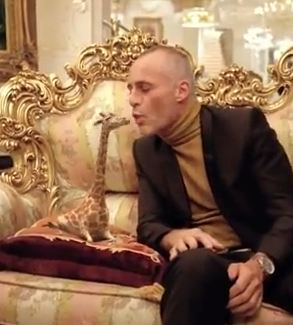
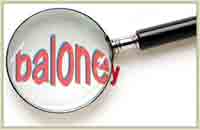 "I considered it right to follow the example of England, the East India Company and the merchants to whom I had always been accustomed to look up as exponents of all that was honorable in trade --— the Perkins's, the Peabodys, the Russells, and the Lows". Robert Bennet Forbes boasted that he made the very substantial sum of 30 thousand dollars for himself this way in one year. Warren was always more circumspect about his earnings, but the firm's opium profits soared while he was in charge, and his own commissions may have too.
"I considered it right to follow the example of England, the East India Company and the merchants to whom I had always been accustomed to look up as exponents of all that was honorable in trade --— the Perkins's, the Peabodys, the Russells, and the Lows". Robert Bennet Forbes boasted that he made the very substantial sum of 30 thousand dollars for himself this way in one year. Warren was always more circumspect about his earnings, but the firm's opium profits soared while he was in charge, and his own commissions may have too.